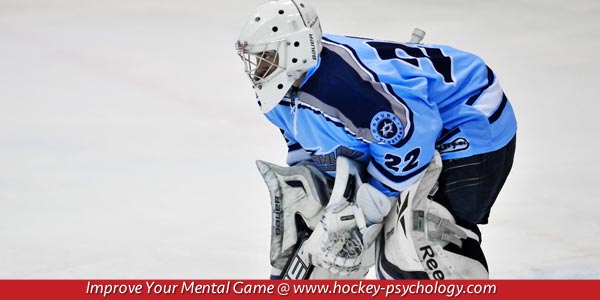Embracing The Pregame Jitters
Most every competitive hockey player experiences what I think are positive pregame jitters – the feelings of excitement or intensity prior to a hockey game.
Some hockey players experience more than just jitters; they under perform due to performance anxiety – a sinking feeling in the pit of their stomach.
Pregame jitters are a natural part of sports, but pregame performance anxiety will cause most players to tense up, worry about their performance, and not perform up to their ability.
Pregame jitters can cause you not to sleep the night before a game.
You might not be able to eat a regular meal the morning of a game. The pregame jitters may make you feel like you want to throw up.
However, many athletes use pregame jitters to instill a positive tingling of excitement in anticipation of a game.
Experienced Hockey Players Want to Feel Positive Pregame Jitters
Positive pregame jitters help instill an optimal level of mental activation, which can boost focus. However, too little or too much physical activation (or anxiety) is not ideal for finding a flow or performing at peak levels.
Your ability to learn how to cope effectively with pregame anxiety is critical to consistent performance.
Your pregame mental preparation is the best time to manage your emotions and thoughts about your upcoming hockey game!
Let’s discover if you are committing one of the 10 “deadly” mistakes during your pregame preparation.
Pregame Mistake #1: Placing strict expectations on your performance
Despite what others have taught you about positive expectations, maintaining high, strict performance expectations can actually limit your success.
One hockey goalie I worked with would think, “I need to score a shut out in the game today,” and unravel when someone scored a goal. I teach my students about the hazards of strict expectations.
You must learn to identify your strict expectations. Your goal is to replace expectations with manageable objectives (also called mini-goals).
Why do high expectations about your performance limit you? First, you set yourself up for a success/failure proposition.
You Either Achieve your Expectations or Fail to Achieve Them
Second, if you don’t achieve your predetermined expectations, you tend to question your ability that day – either during or after performance.
Essentially, expectations set you up for failure before you even start.
In addition, expectations are usually about results such as achieving a personal statistic such as plus/minus or points earned in the game.
Hockey players often judge their game based on these expectations.
In most cases, your expectations equal pressure and pressure can turn into pregame anxiety.
Related Articles on Hockey Mental Game:
- Be Ready when Your Number is Called
- Committing To “Playing Your Game” On The Ice
- Your Mental Game and Hockey Tryouts
*Subscribe to The Sports Psychology Podcast on iTunes
*Subscribe to The Sports Psychology Podcast on Spotify
Mental Coaching Programs for Hockey
Our mental game coaching programs for hockey players helps athletes improve confidence, concentration, let go of errors quickly, and stay composed during crunch-time. Read more about sports psychology for hockey players at Peaksports.com
Please contact me by phone at 888-742-7225 or by filling out the webform below to learn more about our personal mental training programs for hockey players or teams:

Leave a Reply